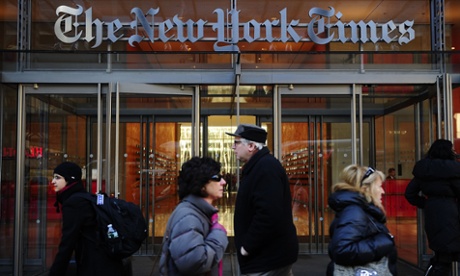- 'Grey Lady' editorial calls for dropping of 44-year ban
- Rating of drug with LSD and heroin 'an increasing absurdity'

One of America’s most influential newspapers, the New York Times, on Sunday called the federal ban on marijuana a “laughing stock” and urged the White House to drop the law and give permission for states to legalise the drug.
Marijuana for recreational use went on sale in Colorado on 1 January; Washington state followed suit this month and Oregon and Alaska will vote on the issue in the November midterm elections. Earlier this month New York became the 23rd state, along with the District of Columbia, to allow cannabis for medical use.
In late 2012, after Washington and Colorado passed ballot measures to legalise recreational use, President Barack Obama said marijuana useshould not be a top priority for federal prosecutors. The federal ban on the drug remains in place, however, and in those states that allow use of the drug state law is in direct violation of federal law.
The Times editorial board argued that the 44-year-old ban was as outdated as the federal ban on alcohol during the Prohibition era from 1920 to 1933. Under the headline “Repeal Prohibition, Again”, the paper argued that the government was out of step with public opinion and states’ wishes and should not stand in the way of the growing use of the drug – both medically and recreationally.
On a web page featuring a graphic in which the stars on a stylised US flag turned into marijuana leaves, the Times said that while there was still an “honest debate” among scientists about the health effects of marijuana, “we believe that the evidence is overwhelming that addiction and dependence are relatively minor problems, especially compared with alcohol and tobacco”.
The US government rates marijuana in the same risk category as heroin and LSD; legally, it is deemed more dangerous than coke or methamphetamine. The Times described this position as an “increasing absurdity” that was “hard for the public to take seriously”.
The piece pointed to the latest Pew Research Centre poll, which showed that since last year a majority of Americans, 54%, have supported legalisation of marijuana. In 1991, more than three quarters of Americans thought the drug should be illegal, a figure that was still at 57% in 2008.
Before Obama became president that year, he admitted that he had smoked marijuana in his youth. Obama recently said he believed it was less damaging than alcohol; when he visited Colorado recently he was offered a puff on a joint by a man in a bar. The president declined to partake.
In April, the retired supreme court justice John Paul Stevens said he believed marijuana should be legalised.
The Times also pointed out that there were 658,000 arrests for marijuana possession in 2012, according to FBI figures, compared with just 256,000 for cocaine, heroine and their derivatives. There are no record of any deaths in the US from a marijuana overdose, the paper said.
The newspaper concluded that the majority of the public had “come around” to the view that the government’s “war on marijuana” was more harmful than marijuana itself. The Times also said the effect of the law was racist, when “black citizens are nearly four times as likely as white people to be arrested for possession”.

The expression of so progressive and colourful an opinion is a surprising move from a newspaper so earnest in its coverage that it is nicknamed “the Grey Lady”. The Times said it would publish a series of articles in coming weeks to support its call for “unambiguous federal action” to end the ban.
New York State’s governor, Andrew Cuomo, has agreed to legalise marijuana for medical use but is nonetheless being extremely cautiouson the issue, allowing 18 months for regulations to be drawn up. Such regulations will only permit ingestion or vaporisation of cannabis, not smoking.
Cuomo has also drawn up a tight list of serious illnesses for which doctors can prescribe the drug, including cancer, Aids, Parkinson’s disease and multiple sclerosis – and not the more vague condition of “chronic pain” that is widely used, and in some cases abused, in many other states to have legalised medical marijuana.

Nenhum comentário:
Postar um comentário